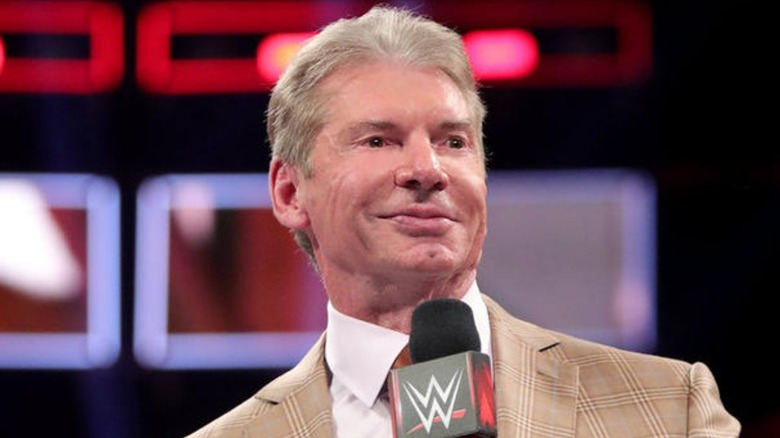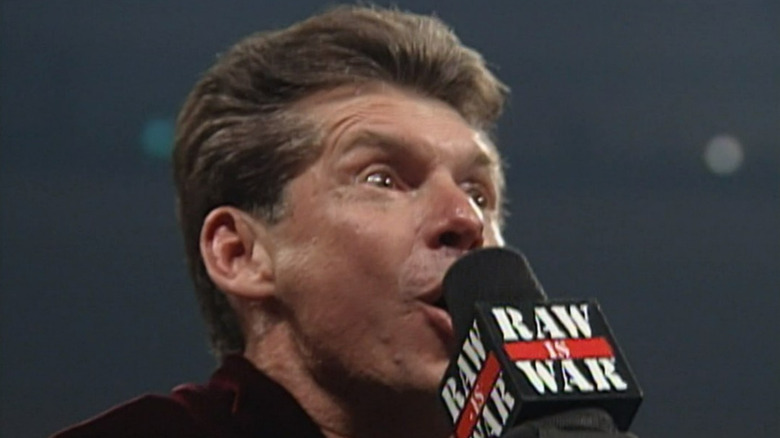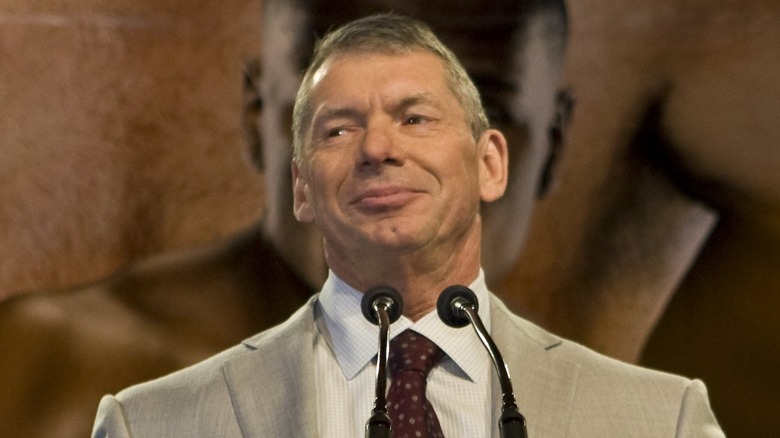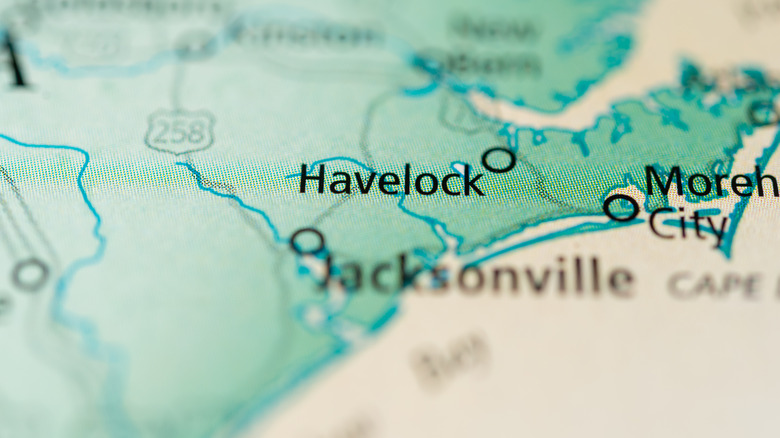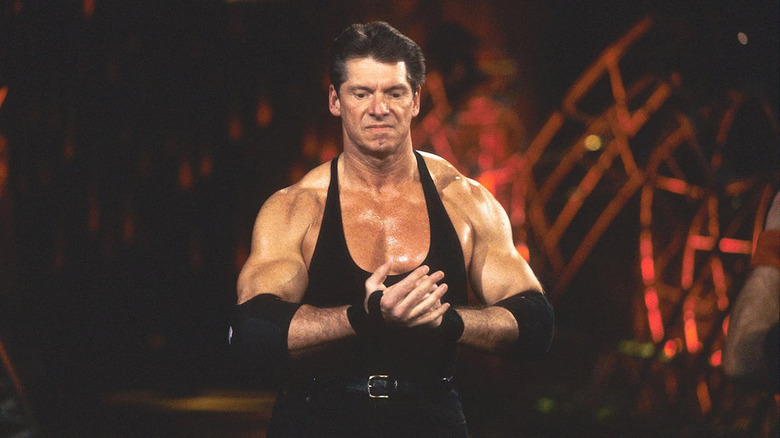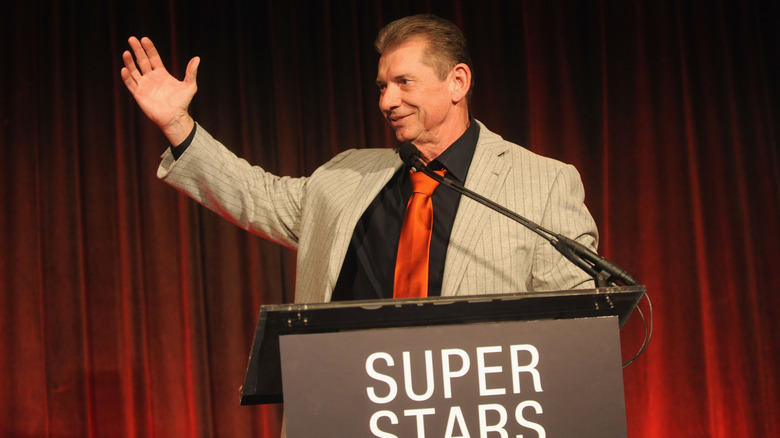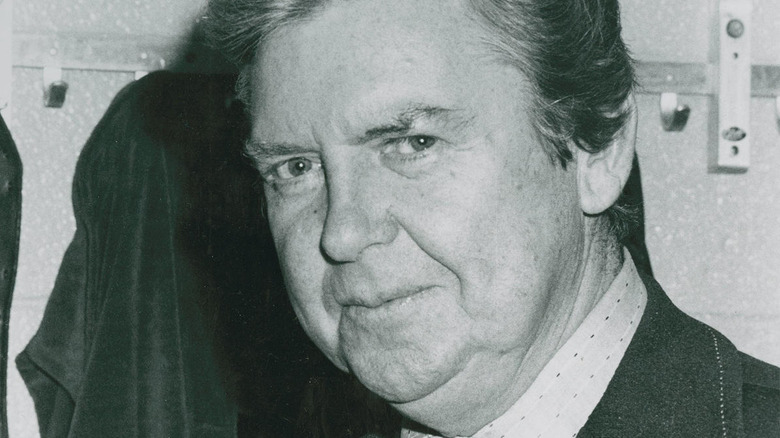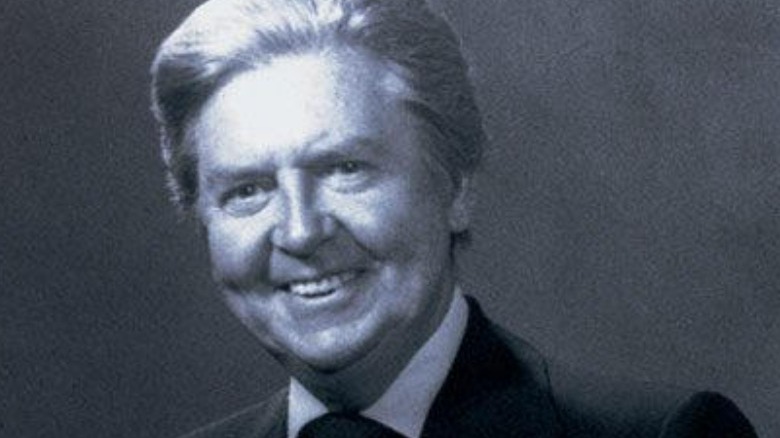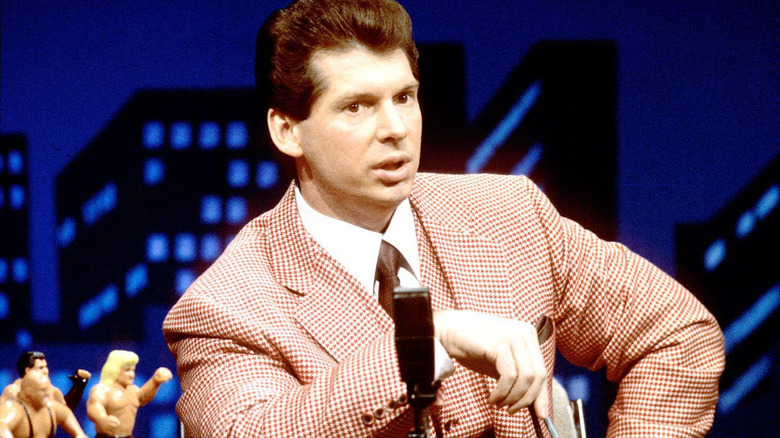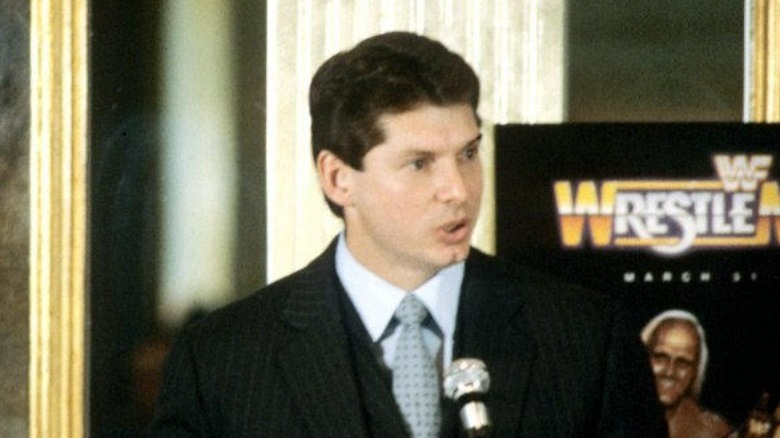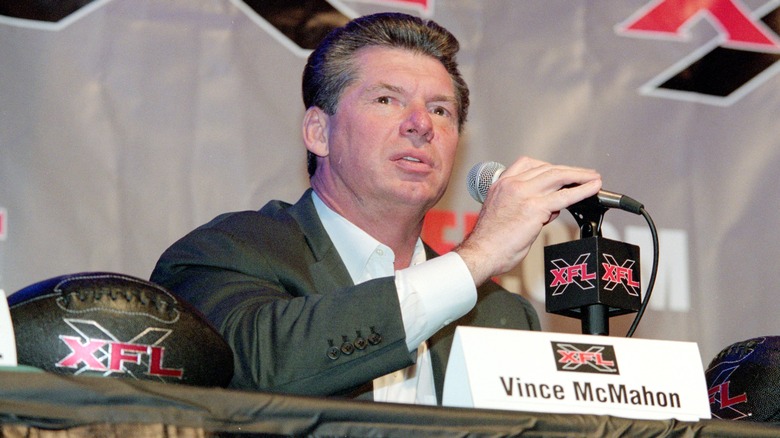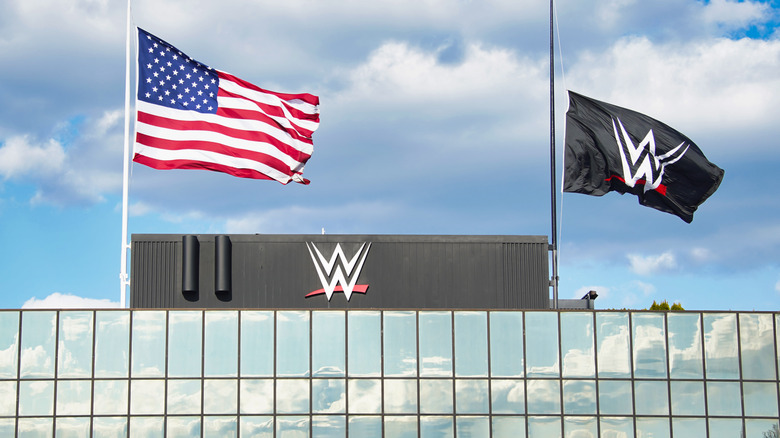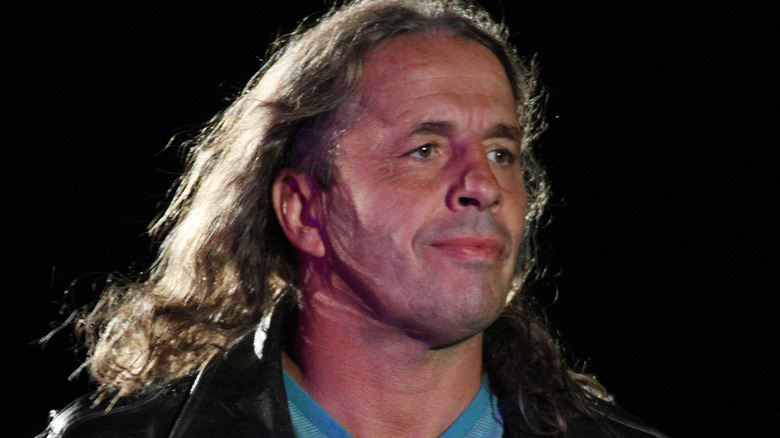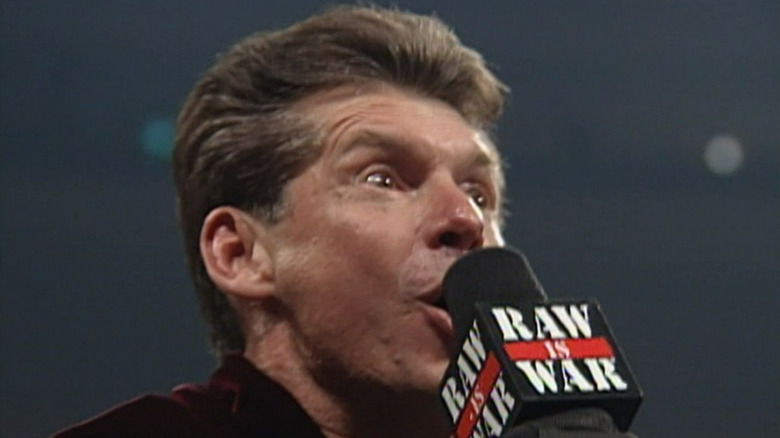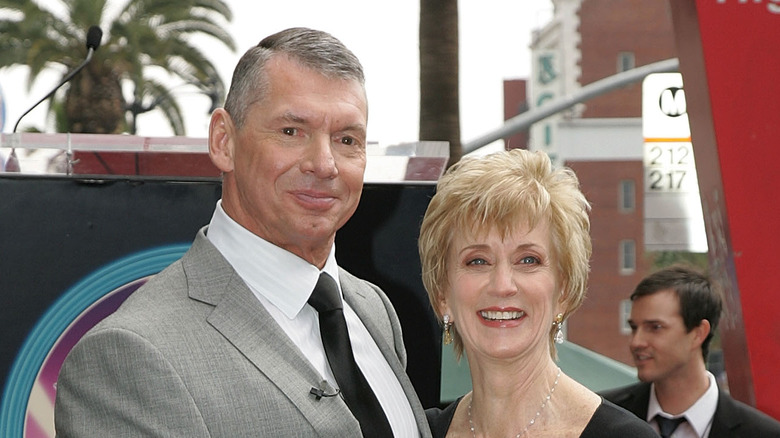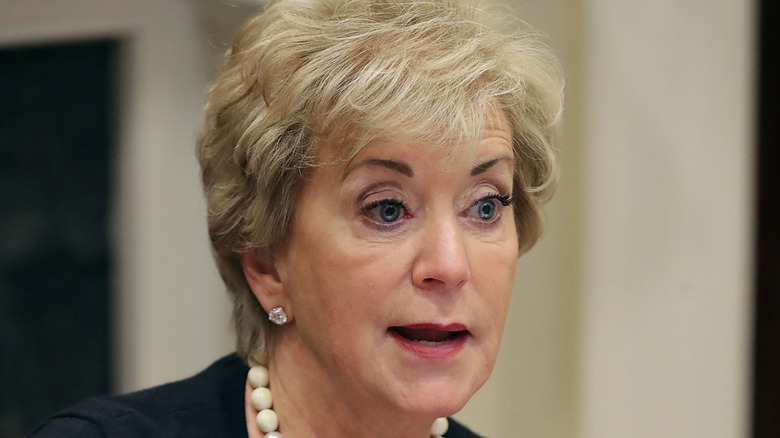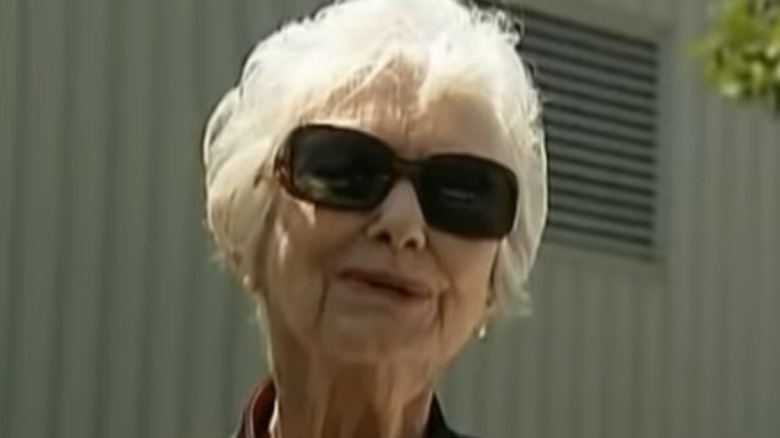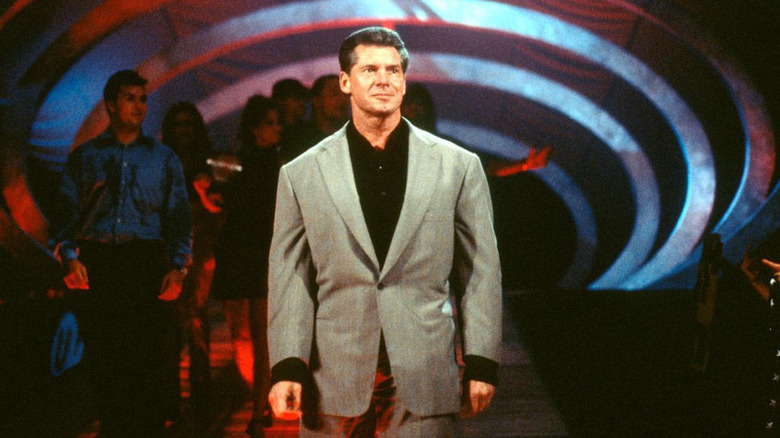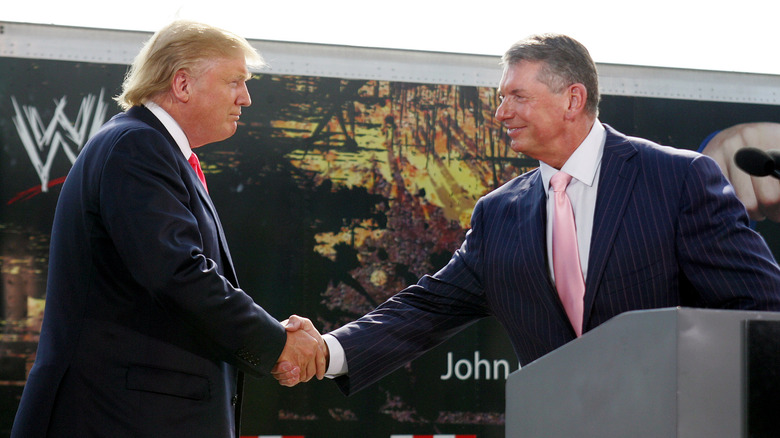'The Ringmaster' Author Talks Researching Vince McMahon Biography, WWE Chairman's Childhood, Vince Sr. Relationship - Exclusive
Vince McMahon is inarguably the most consequential person in the history of professional wrestling. He reshaped an entire industry to his vision, for better and worse, after fighting and clawing his way to the top, to the point where the letters WWE are synonymous with wrestling to the general public. He's been in the public eye for half a century, and has been involved in many endeavors — some of which were notable failures — outside of wrestling. His rise and fall -– at least his own version of his rise and the public account of his fall –- and quasi-return are well documented.
So what's left to tell? Plenty, as it turns out. And it sure looks like a healthy chunk of Vince McMahon's own story was some version of kayfabe.
Abraham Josephine Riesman, author of Stan Lee biography "True Believer," takes a deep dive into McMahon's life in "Ringmaster: Vince McMahon and the Unmaking of America." Riesman meticulously researched Vince, interviewing everyone from former business associates to childhood friends, creating the most complete picture of WWE's once and seemingly forever chairman to date.
Wrestling Inc. spoke with Riesman about "Ringmaster," out now. She told us about researching Vince's heretofore underreported childhood in North Carolina, his relationship with Vincent J. McMahon, and how this particular brand of kayfabe influenced our cultural and political landscape.
WWE's response (or lack thereof) to 'Ringmaster'
Have the McMahons or WWE ever tried to stop your book or interfere with your book?
Nope. They've done nothing. The WWE approach to this book and to my reporting and writing elsewhere has been a total no sell, as you would say in the wrestling biz. They just don't acknowledge any of it. I'm not saying this out of resentment. I'm not saying they should be acknowledging me. It's just fascinating that their approach has been to not even engage with me in private.
I mean, when the book was about to get announced three years ago, I gave WWE a heads-up just so they wouldn't be caught off guard, and therefore maybe we could have a relationship enough that I could get some access. So I gave them a heads-up. The publicist I wrote to thanked me and said, "Don't get your hopes up about access, but I appreciate the heads-up." And then nothing. I tried to get them on board with maybe letting me look at some stuff or talk to some people. Nothing doing.
Then last June, I published that profile of Rita Chatterton, and as part of that, I had contacted WWE and been redirected to their crisis PR firm that they were working with. And the crisis PR firm said, "Sure, send us some questions, and we'll see what we can do." So I sent a detailed list of 30-odd questions for legal purposes to give them a chance to respond to the allegations in the article. Total silence. No response to that email, despite days of advance warning before the article came out. And then after the article came out, absolutely nothing again. And Vince went on "SmackDown" that Friday, and did his little promo where he said, "Then, now, together forever, welcome to 'SmackDown,'" and threw the microphone, and that was it. That was their strategy. And it still is. They just don't acknowledge that any of this stuff exists.
And that is especially interesting because I don't think there's anything in this book that is more damaging to Vince McMahon than the Rita Chatterton revelations. But there is a lot in here that just shows how much he has outright either lied or embellished, especially about his origin story. And they had no interest in even stopping that myth because that is so integral to the WWE story, his origin story.
I can't blame them. I feel like if I were in their position, this might be my strategy. Just don't acknowledge. I think eventually there may come a point when they have to acknowledge if the book is big enough, God willing. But I don't know. I'm not Roman Reigns. I'm not out here saying, "Acknowledge me." I'm just saying it would be interesting to see what WWE's response would be, if they do have one at any point. I think Vince's days of lampooning his enemies on television are over. I could be wrong. But I don't think we're going to see Austin Theory rebrand as The Journalist, and get body slammed every night. Although that might be interesting.
Vince McMahon's kayfabe childhood story
So Vince's childhood, the first half of the book, I think probably has the most original research out of everything in here.
That's correct, yes. I will fully admit that for longtime wrestling heads, the first third of the book is going to be the most stuff you've never heard before. Beyond that, what I attempted to do – because to my great benefit, a lot of reporting had been done, or at least cursory reporting of the basic story – had been done about a lot of the stuff that came after he actually got into wrestling as an industry. But for that stuff, I tried to be original in how I frame it and how I synthesize it and streamline it. But you're totally right, that the first third of the book is the most "well, nobody knew this ever before" information.
It's very clear that Vince McMahon, or Vinnie Lupton to be more specific, had a very rough childhood. I don't think there's any disputing that. But it was not rough in a lot of the ways he has advertised or talked up. And you come to a lot of people who outright say "no, Vince McMahon never did this. No, he never was violent in this particular way."
Yeah, he wasn't court martialed at his military school, as far as I could tell, and as far as anybody I talked to remembered. That sort of thing, yeah.
And I'm tempted to believe there was no court martial, because you'd think a military school would have records of every court martial.
Especially the first one, as he claimed it was. So, yeah, I mean, let me put it this way. For the majority of Vince's life, especially since he entered wrestling, he has not talked about himself. He has not talked about his childhood certainly. Even when he talks about himself, it tends to be in sort of these vague notions. And when he was talking about his childhood, it was a very rare and brief period when that was happening. From 1998 to about 2000, 2001, he did a few interviews where he talked about his youth.
And although it was only a few interviews, he was very on point in all of them in saying, "I was a rough and tumble youth." As you say, he had a rough childhood. And he says, "Well, it made me rough. And I was constantly getting into fights. I was fighting with Marines. I was pulling pranks on my military school commandants." All that stuff. And as far as I can tell, that was kayfabe. That was Vince trying to bolster the Mr. McMahon character in the public eye. I mean, it's not just kayfabe. It was neokayfabe. The term I, perhaps vainly, introduced in this book. It was him using other channels of media, other than his own programming, to advance a narrative for that programming.
So he talked about himself and his youth as being this jerk and being a juvenile delinquent. But as far as I can tell, even if his home life was rough and his economic circumstances were rough, he himself was not that rough of a guy, or a kid, I should say. People say he was nice, he was genial. He didn't make much of an impression. If anything, that was the refrain: "Yeah, Vinnie Lupton, I sort of remember him. He didn't really do much." I mean, even people who knew him would say, "Yeah, he was fun. He wasn't a terrible student, wasn't a great student. He was just kind of a middling kid."
And then he gets into wrestling. At 12, he meets his father, and everything changes. Not instantly, but he goes on this other path that I think led him to a lot of abusive practices that I don't think he would've ... maybe certain energies would've been channeled into something else. But as it happened in this timeline, whatever resentments Vince had, he ended up channeling into wrestling.
Talking to McMahon's childhood acquaintances in Havelock
I do have to take a minute to acknowledge the scene where you talked to a bunch of his old classmates at a Bojangles.
Went over to the Bojangles in NC. I was in Havelock. And before I got to North Carolina, I'd been on some Havelock Facebook page asking if anyone knew Vinnie Lupton. And somebody who was too young to know him said, "Hey, I don't know anything about that. But there's a bunch of old timers who hang out at the Bojangles every morning at 10:00 AM. And if you want to go over there, I'm sure they'd talk to you." So that's what I did. I just showed up at 9:45. They all showed up at 10:00. I had already spoken to one on the phone, and I was like, "Hey, do you mind if I interview you about Vinnie Lupton." And they were only too happy to talk.
And what they said was fascinating. I was like, "Did he get into all these fights with the Marines at the nearby Marine base," as he had said in this interview. They sort of laughed. The two who'd known him well, and who had themselves been brawlers with Marines, et cetera, and were a little older than Vince, said he was a wannabe. As they said, "He was a little punk," which meant something a little more potent back then than it does now. He was a little punk. He was a kid who wanted to be a fighter and kind of wasn't.
And then eventually he goes to military school, and this was arguably my favorite thing that I learned. My favorite revelation was learning about how Vince started in pro wrestling, which was not working for his father. It was doing wrestling shows in the gymnasium at his military school, which he has never talked about. And why? Because if you found out that the fighting he was doing in school was pretend as opposed to real, then you think less of him as a badass. But he's a showman more than he is a badass. And that was a word that people kept saying. Every stage of his life, if I was interviewing somebody who knew him, it was even odds they'd say the word showman. And one of the greatest shows he's ever produced is the tale of his life, which is not exactly accurate.
Vince McMahon's seemingly invisible years
Were there any revelations from his childhood in particular? I know you talked about him having his own little wrestling fed, and him being more genial, him being less of an impression. Was there any particular thing that you just looked at and went wow?
I think one of the most interesting things about Vince's youth that I found was actually something I didn't find. I found a lack. I went to Havelock, which was one of the places where he lived, and I looked through literally every page of every issue of the local newspaper ... the Havelock Progress. It wasn't a very big town, so they had coverage of virtually everybody. And Vince was — or Vinnie I should say — not mentioned once in the years that they lived there. And it's not just that, literally every other kid in his blended family – his older full brother, and his two step siblings – they were in the paper all the time. Even if it was just little stuff like, "Hey, Ernestine went to a party." But Vinnie wasn't going to these parties. He was not playing on the sports teams.
I found it so interesting that up until he learned about his father's brand of wrestling, it really seems like this kid had no designs on anything. He was kind of just fumbling through life, doing whatever, being a pretty ordinary person. I don't think he grew up until he was 12 and he met his father, with any kind of illusion that he could be something bigger than he was. That was something that was very surprising. Because you often hear stories about the great men of business, the great men of politics, and it's always, from a young age, they were gunning for the top. I don't think that was true. I think Vince was content to be a normal kid until he saw a vision of something else that he could be when he met his father.
Why Vince McMahon doesn't claim North Carolina
You mentioned that he never came back to visit except for business related reasons. And when he was asked later, he indicated that he grew up in Virginia, rather than growing up in North Carolina. And even though he even went to college in North Carolina, he completely excises North Carolina from his biography, except for maybe that Playboy interview he did. Do you have any insight as to why he never mentions North Carolina in his life?
He wasn't happy there, and he doesn't even really like the South. I only learned this unfortunately after I'd finalized the text, but I talked to somebody who had worked at WWE. He was talking about how Vince had this very firm pronouncement that he really doesn't like southern accents. Vince, I think, has a lot of insecurity about being a poor boy from the South. I think, like a lot of people who come from circumstances like that and then become rich conservatives, there's a very ambivalent relationship to the poverty and circumstances that you came from initially.
On the one hand, it's cred. It's "wow, I came from nothing and pulled myself up by my bootstraps." But if you're in certain circles, wealthy circles, you don't want people to think you're just a nouveau riche yokel who doesn't know anything. If you're trying to make it in Greenwich, Connecticut society, and have this beautiful house in Conyers Farm, you have to present yourself such that it seems like you deserve this wealth, and you didn't just accidentally luck into it.
So I think Vince has developed an inferiority complex to a certain extent about the fact that he comes from a culture that he doesn't even really enjoy that much anymore. Rural southern culture is not something you hear from him. He doesn't go out on a ranch, he doesn't live in the South. None of that is all that important to him. So I think he excised it except for those few times when it was advantageous for him to present it. Because even if he presents himself as a populist and a hero of the common man, I think he has a lot of status anxiety. Who among us doesn't? Especially when you're up in those echelons. I think he thinks a lot about how other wealthy and powerful people perceive him.
Vincent J. McMahon
Let's finally talk about his father, Vince Senior — who you always call Vince Senior in the book.
Initially, I was going to call him Vincent. But my editor/spouse, S.I. Rosenbaum, was like, people are just going to get confused. Because people are going to read "Vincent," and they're going to see "Vince" ... It's too early in the book to be confusing people like that. So I decided to just be blunt and make it easy for the reader by calling him Vince Senior. I don't call him McMahon. Well, there's a lot of McMahons. This was my problem with the first book, "True Believer," as well -– I had to use the first name because it's actually journalistic practice. When you're writing about a family where a bunch of people have the same last name, you identify by first name whenever you can because you don't want to confuse the reader. I mean, there's no way to avoid that.
But I think it has a double advantage. I mean, there's a lot of McMahons in this story. So if I was just saying McMahon, that wouldn't make any sense. But also, I really like the intimacy that referring to the biographical subject by a first name can achieve. I don't think you can do it with every person you write a biography of. But at least the people I've written biographies of so far, Stan Lee and Vince McMahon, everybody refers to them by their first name. Stan was just, when you ask somebody about comics, they'll say, "Oh, blah, blah, blah," and then also, "Well, that was Stan's idea." And you know who Stan is. They don't say, "That was Lee's idea." And the same thing with wrestling. Everybody just says Vince. Very few people will call him mononymously McMahon. It's always like, "Yeah, Vince is doing this," or, "Vinnie's doing that."
Vince Senior, J. Edgar Hoover, and Dr. Jerry Graham
His father ... he's a bit of an enigma here just for the simple fact that he's dead, and most people who knew him best are dead. But it's a very interesting portrayal you have of him, which is that he was very kind to his family, and he was apparently kind to his wrestlers and talent. But you bring up legal records, business records, and some behind the scenes comments that show that he was not as kind when they were not in the room.
Correct. Vince Senior has a reputation as a smiling, cheerful, glad-handing, generally benevolent promoter. And that comes very largely from WWE narratives. That's how he's portrayed. And WWE is still -– for better and well, really, mostly just for worse –- the gatekeeper for its own history. And for the history of wrestling in general, since it owns all those tape archives and creates "documentaries" that advance that history, and very often become the only extant history of something. And so Vince Senior, thanks to that manipulation, has been portrayed in a very one-sided and hagiographic way. But you don't have to dig too far to find the truth.
I mean, I owe a lot here to the pioneering work of David Bixenspan, the reporter who had FOIA-ed FBI records related to this case where the Justice Department cracked down on the National Wrestling Alliance, the old cartel that ran wrestling in America. He uncovered this document where the FBI had written a memo to J. Edgar Hoover, of all people, saying, "Hey, this guy, Vincent James McMahon, intimidated somebody before their deposition." And they had him on tape. They had him on tape saying about Dr. Jerry Graham, who happened to be Vince's favorite wrestler, by total coincidence, saying of Dr. Jerry Graham, "You know, I told him you know where your bread is buttered. Self-preservation, f**k it." It's an amazing line. It's an amazing, incredibly blunt line.
There's another one where J.J. Dillon, longtime McMahon employee told me, but also titled his book this, that Vince had told him once, "Hey, I just talked to my dad and he said the weirdest thing. He said, 'Wrestlers are like seagulls. All they do is eat, s**t, and squawk all day.'" I don't think Vince Senior held his wrestlers in very high esteem as a class. I'm sure there were individual wrestlers that liked him and who he was kind to, but as a class of human, his workers were not sacred to him. They were somewhat interchangeable.
And that's not even just the wrestlers. That's how Vince got his first play-by-play gig was because Vince Sr. very brutally fired and humiliated the previous announcer. And then nepotistically just picks his son to replace him -– his son, who has virtually no experience. This was a guy, Vince Senior, who held enormous power in his region and was not afraid to use it in a sadistic way. I say sadistic because of the Ray Morgan story. Ray Morgan was the predecessor on the play-by-play mic. And he wanted a raise. He demanded a raise. Vince Senior negotiated with him and acceded to the demand, gave him a higher wage. And then immediately after that agreement, fired Ray Morgan and hired Vince, his son. Not only did he hire him, he hired him at the new higher wage. He wasn't even saving money on this. He was just telling the world I am not someone to be f****d with. And Vince learned a lot from his father.
[Note: David Bixenspan is currently contracted by Wrestling Inc.]
Vince McMahon's relationship with Vince Senior
I remember reading that. And I'm like, well, okay, I can definitely see him firing someone. The same rate was really shocking to me.
That was crazy. I know. That's from this obscure lawsuit that was not directly about that, but had a bunch of information about it. And I was just blown away. What a swinging dick move to just go, "you know what? I don't even care that I'm losing money on this. I'm just going to humiliate you and put you out of a job." And Vince, when he tells that story — although he tells sort of a modified version of it that doesn't involve all those details -– he does talk about the firing. And he says he witnessed it. And he talks about it in these praising terms. He's like, "Wow, I thought it was so cool that my dad told this guy to take a hike." He derived a completely different lesson from that than you or I might necessarily.
Something that has stuck with me for a long time is I remember Paul Heyman once was talking about the time he cut a shoot promo on Vince –- the You Stole My Legacy promo.
Yeah, yeah.
And Heyman said that even doing a shoot promo where Vince McMahon was basically giving him carte blanche to say whatever he wants, and he brought up Vince Senior Heyman said that you cannot bring up Vince Senior around Vince in anything but reverent terms, or at least watching how you speak around him.
I wish I had seen that interview! I would've included that! I mean, I'm not surprised. It's certainly what the product has demonstrated. But I didn't know Heyman had said that specifically. That's fascinating. Again, I'm not surprised. I think Vince has extremely complicated and under-interrogated feelings about his father. At the risk of turning into too much of a psychologist, which I'm not, what the narrative suggests to me is that Vince is constitutionally incapable of admitting how much he hates his father. He's channeled all of his resentment towards his father into his wrestling. And what remains, when he talks about his father, is just this beautiful portrait of a magnanimous man. And yet, when Vince tells the stories about Vince Senior., they're never happy stories. He talks about how much he loved his father. And every story is "he was mad at me," or "he didn't agree with me," or "he didn't tell me he loved me." It's very interesting to see that kind of paradox. I think it really torments him, whether he knows it or not.
The true story of Vince McMahon buying WWE from Vince Senior
And the two also have this kind of Forest Gumpian way of showing up at every big spectacle — like, every pay-per-view disaster. Like how they were financially invested in Evel Knievel's Snake River ...
The Snake River Canyon Jump, and the Ali-Inoki fight, two of the great disasters of '70s television or '70s broadcasting, however you want to call it. And yeah, the McMahons were at the center of both. It's crazy.
You also mentioned something in this book that Vince Senior ... it's known that he sold the company to his son, but I think you break the specific way he sold the company to his son.
It had been reported, but I don't think widely. But the way he sold it ... They were balloon payments. He had to pay four installments that added up to more than a million dollars. And with each installment, if he missed that installment, not only would he not get the company, he wouldn't even get the money he'd already paid back. It was a very punitive arrangement, and very stark contrast to how Vince Senior had gotten the company, which was his father left it to him. His father, Jess McMahon, as far as I can tell, just gave the company to his son. And then when Vince Senior was presented with the fact that when he wanted to retire and cash out, he could've just given it to Vince, but he made Vince buy it, and buy it in a very precarious circumstance.
Yeah. And Vince agreed to that, is one of the crazy things.
Well, he wanted the company. And this is one of the great mysteries that I will fully admit I do not solve in the book, is how Vince got that million plus dollars. There's a lot of rumors about it, but nothing I saw that was conclusive enough. He himself said he talked to a guru, and a really smart guy, who I've never been able to tell if that's the same person, or whether the guru and the very smart guy were two different ones. And he was able to pull together the scratch. Yeah, I mean, he really wanted that company at that point. He really wanted to prove to the world that he was somebody. And boy, he did –- he proved it all over us.
Why McMahon comes up short outside of wrestling
Why do you think Vince was such a failure at everything that wasn't wrestling?
That's hard to say. I mean, it's hard to succeed in anything. I'm sure there are a lot of obstacles if you're trying to make it in the film industry, body building, whatever. I think the fact is it's more that Vince was able to succeed in the wrestling business because, even though his father was a little punitive, he still had the huge leg up of being his father's son, and having gotten those jobs nepotistically early on.
And I think in the other industries, Vince never had that kind of existing presence that he could co-opt. It was always like "I'm going to start from scratch and be better than the existing institutions of this already beloved thing," whether it's body building, or football, or movies, whatever. He's trying to reinvent the wheel in those industries and start from zero, as opposed to wrestling where the narrative is that he completely upended and revolutionized wrestling. But I would argue that he just maintained a lot of what was already there. Both what made wrestling good and what made wrestling bad, there was still a lot of in Vince's iteration of it.
Wrestling's code of omerta
Did you have any trouble talking to contemporaneous wrestlers, anybody who was part of the company, getting them on record?
Yeah, I didn't talk to anybody who's on the roster. One of the reasons this book has a core narrative that ends in 1999 was I wanted to be able to tell an honest story. And the closer you get to the present, the tighter the NDAs get. And I'm good, but wrestling's code of omerta is very strong. So the more time passes, the more likely people are to talk, and the more likely they are to talk if they don't owe Vince everything. Even if they liked working with Vince, if you started your career without Vince and you're an old timer, you're more likely to want to be honest, or at least partly honest about Vince, or at least talk to me.
I talked to more than 150 people. But I did not talk to a ton of people who are currently working for WWE. I talked to a few. Some on background or off the record. But Vince runs a tight ship. He doesn't cotton to people talking out against him unless it's strictly authorized, and you're CM Punk in 2011 or something. It's not something that you're allowed to do at that company. So I didn't talk to a lot of people who are currently there, but I don't think that's a problem. Because the story I was trying to tell ends in 1999, and I talked to a lot of people from behind the scenes from his birth up through '99.
Bret Hart on record
Who was the most surprising person you got on record for this book?
Bret Hart. I was not expecting Bret Hart to want to talk to me, just because, why? He doesn't need to. And then once he did talk to me, I was shocked at how much he wanted to say and how willing he was to hop on the phone over and over again. I mean, I must have logged upwards of eight hours of interview tape with Bret. And I'm very grateful for that. He gave me a lot of insight. His memoir was a crucial source because it was all based on contemporaneous audio diaries. So it's about as close as we have to inside journalism from the WWE in a lot of those periods. And I thought it was just going to be "I'll plumb from the memoir, and he's going to maybe do one interview with me in addition to that, where I can catch up with him on stuff that's happened since the end of the memoir." But no, he wanted to just keep going. He was very helpful.
He has his own narrative and agenda, like everybody does. But I generally found his statements to be backed up by cross referencing. And I don't know, I got a relatively reliable vibe from him. I wish there was a more artful way to put that. But as a journalist, you have to cross reference. And then a lot of it's just going, "I'm picking up on clues that suggest this is a person who's generally telling me the truth." So Bret was an extremely useful source.
I was surprised to get all those people from his childhood. One of the most interesting interviews I did was with Shell Davis, his best friend from when he was in sixth grade, who had watched wrestling and knew who Vince McMahon was, but had no idea that Vinnie Lupton, his childhood friend, was Vince McMahon. Crazy.
Also the guy who cremated Andre the Giant. That was a crazy story. It turns out that Andre was not only cremated within walking distance of where Vince had been born in North Carolina, but also the person who cremated him had been best friends with Vince's stepbrother, and had known and seen Vince as a child. Very weird. That interview was very moving and very eerie.
The kind of thing that makes you believe in destiny.
That's the thing! Wrestling will do that to you. There's so many f*****g weird coincidences and stories with these eerie rhymes and improbable outcomes. I mean, the Ultimate Warrior gave a promo where he talked about dying, and then within 24 hours had a heart attack and died. You can't make this s**t up.
Lots have changed, but nothing's dated
So I know you said the story ends in 1999.
Yeah, June '99. It ends with the end of the Greater Power saga when Vince unhoods himself and reveals that it's him, "It's me, Austin! It was me, Austin! It was me all along, Austin!"
But obviously you were still in the draft phase when Vince McMahon stepped aside, and then the book was basically ready to go when he came back. Were there any discussions of hold up, we got to change some things?
Not really. I mean, the book is dated in one particular way, which is, due to the accident of when the text was finalized, I had to factually refer to Vince's tenure as an executive and board chair as being something of the past. I had to refer to it in the past tense. At the very end, I make sure to tell the reader in the epilogue that he's definitely not down for the count, and we shouldn't count him out because he was still the principal shareholder for the company. But I did have to write about him in the past tense.
Other than that, there's nothing dated about this book. The core narrative ends in '99. So I don't have a ton of detail on the Wall Street Journal stories, but it's a robust epilogue. I definitely talk about it. And let me put it this way, I don't think anybody who reads my book, and then learns about the recent allegations for the first time is going to go, "well, those things aren't consistent with what I read in the book." You'll learn about other things having to do with Vince, and see how they fit into the larger framework because it's all compatible. It's all extensions of stuff that he's been doing for a long time, or allegedly been doing.
Vince's history of affairs
Before these allegations even came out, he's been open about the fact that he's had affairs. And even with these lawsuits against him, he does not deny that an affair occurred. But there are a couple times relatively early in his marriage to Linda, at least once, where you find someone who went on record and said Vince was having an affair at that time.
Yeah. In the '70s. I talked to John Aldi, a friend and co-investor of Vince and Linda's, who told me in no uncertain terms that Vince was having an affair in the '70s, which is relatively early in the marriage. They only got married in 1969.
And yeah, Vince has been open about it. It's even in the legal record. Like in Vince's steroid trial, it's not a centerpiece, but Emily Feinberg, his former secretary, was testifying. And in advance of her testimony, there's this little dialogue in the court transcripts between the judge and the two lawyers, the one for the defense and the one for the prosecution, in which the judge says, "Okay, so we're not going to talk about the affair today, right? And the lawyers say, "Yeah, we're not going to talk about the affair." And the judge says, "But we are going on the record that Vince had an affair with Emily Feinberg, right?" And the lawyers say yes, including the lawyer for the defense.
So we have on the legal record that Vince at least had an affair with Emily Feinberg. But then there's also the Playboy interview a few years later where he said he had not been faithful to Linda and all of that. So yeah, part of that is a very deliberate strategy in that if you admit that you're an unfaithful horn dog, people are going to be a little less surprised, shocked, or outraged when it turns out that you may or may not have committed sexual misconduct.
The enigmatic Linda McMahon
And let's talk about Linda for a second. You talk about how he met Linda, you talk about how they got married, and you say that there is a big information gap between when they met and when they got married. And in fact, there's a lot of information about Linda that is not even, I wouldn't even say, part of the public record. Stuff you couldn't even dig up.
No, Linda has scrubbed her past a lot more than Vince has! A lot more than Vince has! And she's lived a less ostentatious life too. My hope is someday to do a sequel to this book. And if I do it, my plan is to focus a lot on the women in Vince's life. It would pick up in '99, but I'd have a robust beginning where I sort of get us up to that point by talking about the women in his life, who I wish I'd had more space for in this book. But you have Victoria Hanner, his mother, a very important and difficult relationship for Vince. You have Linda, you have Stephanie. And these three women are enormously important to understanding Vince and understanding the direction of the company. But we know so little about all three of them.
I was able to dig up a lot of stuff about Vicki, his mother. But I'm saving that for the sequel because there was no real place to put it in this. Stephanie, I hope in the sequel to have the opportunity to dig deeper, and I think I can find some stuff. Linda, I don't know. A lot of Linda's contemporaries from her childhood are dead, or old and not reachable. And she's really, I think, actively worked to purge the internet — at least, I mean, maybe not herself personally, but getting other people — and the media of any information about her life.
She ran for Senate twice in freaking Connecticut, a media dense environment! Nobody could find anything about her past! The earliest thing that was addressed was her bankruptcy alongside Vince in the '70s, which she hadn't talked about. Or she had talked about, but hadn't talked about how she hadn't paid back the creditors. But beyond that, we don't know. I hope to find out more. But I will fully confess that this is not a biography of Linda, and there will be gaps in your knowledge of Linda, because there are gaps in my knowledge of Linda. And if I'd had more time, and more of a scope to include her like that, then there would've been more in this book. So apologies for that, but I hope you find interesting what is already in there.
The child of Vicki Hanner
Well, we talked a little bit about his mother. And I remember privately you once told me that Vince is almost better understood as the child of Vicki Hanner than as the son of Vince McMahon.
I think I sort of was speaking too soon there. When I told you that, I think I had not found out enough about Vince Senior yet. That was during the research. I was really blown away by the influence Vicki had in his life. But I felt like more relevant to the origin story I was trying to tell, how did Vince McMahon – how did Vinnie Lupton, shall we say, as that was his childhood name – become Mr. McMahon. How do you go from Vinnie Lupton to Mr. McMahon? That's the real question of this book. And Vicki plays a part in that. But Vince Senior plays a much larger part in that.
Now, that's not the whole story of Vince McMahon. I think there are many ways in which his relationship with his mother is a lot more important than his relationship with his father. But when it comes to the wrestling industry and what happens –- the reality warping capabilities of wrestling – his father is the more important one. So I probably spoke too soon about that. I was probably trying to be a little spicy, but I do think her influence is greatly underestimated, and I hope in the sequel to be able to address that more. I mean, I found out about her later life, her earlier life. I learned a lot about Vicki. She died at 101 last year. There was a lot to talk about. So hopefully in the future I'll have an opportunity for that.
Feelings towards Vince McMahon
Vince McMahon, you make it clear that he's extremely influential, but you also make it clear you do not think he is a good person and has done a lot of harm.
I don't know that I'm necessarily saying good or bad, but I am showing the harm that has been done.
And that does get emphasis, probably because harm generally has more impact than good, at least a much more visible impact.
Yeah. The trauma leaves scars. I do try in the book, though, to talk about the ways in which he was a success and the ways he remapped the wrestling industry. I'm not just saying here's this list of horrible things about Vince McMahon. It's a little more than that, but yeah.
Ultimately, what I was getting is throughout all of this – throughout learning all of these things about him, a lot of which are very kind of breathtaking, and a lot of them are negative or traumatizing or scary, do you have any affection towards Vince McMahon, I guess you could say?
I think I had empathy towards him. I don't know about affection. I'm not sure affection is appropriate for a biographer. A lot of people write biographies from places of affection, and that's fine. But I think you have to have more critical distance than that. That doesn't mean you have to write a hatchet job, but I think it's okay to have affection for the creations of the person. But the person themselves, you need to be both skeptical and empathic, but not affectionate, and also not hateful. You need to find a way to be more in the middle zone of skeptical without being hateful, and interested without being affectionate, or at least enthusiastic about what happened and what they made.
And I love a lot of the wrestling that Vince has produced, you know? You and me, and many of the readers of this esteemed publication, are going to be able to list in their head 10, without even thinking about it, amazing moments of their life that Vince McMahon is largely responsible for. Or at least that wouldn't have happened in the way they did without Vince McMahon. So I don't want to discount that. The art form of wrestling has had a lot of amazing moments under the tenure of Vince McMahon. And I appreciate those, but you can't overlook the harm done on the way.
Kayfabe is how we got here, not how we'll get out
What do you want people to take away from this book more than anything?
I'm trying to let people have a "They Live" sunglasses moment, to cite Rowdy Roddy Piper, where I want people to be able to see the world differently by having learned about kayfabe, and my little neologism, neokayfabe. I think the story of Vince McMahon is astoundingly important insofar as it gives you a better framework for understanding how we got fascism in America, and how we ended up in this blighted media and information environment. I think his life is a perfect textbook set of frameworks for understanding all of that.
The unique brand of American fascism depends on a lot of the logic that you see in pro wrestling. Now, you can make arguments about whether pro wrestling created that phenomenon, or whether it's parallel evolution. Who knows? But I do think that if you read this book, you'll walk away –- especially if you have no wrestling knowledge, but even if you do have a lot of wrestling knowledge -– I hope you'll walk away from this book and say, "oh, so that's not going to work in our fight against fascism." And that in that sentence is you can't just fight fascism with fact checking and virtue. You can't just say, "Hey, you're a bad man and a hypocrite," to Vince McMahon and expect it to have any effect because he's been spending 20 odd years plus telling everyone, "Hey, I'm a hypocrite and a bad man."
And for some reason, a lot of the people who resist fascism in this country still don't understand that you can't fight contemporary American absurdist fascism with simply saying, "Oh, well that's incorrect," or, "That's evil." It doesn't have any effect. So I hope that we can come up with better strategies, and I hope my book does some small part in pushing us there.
